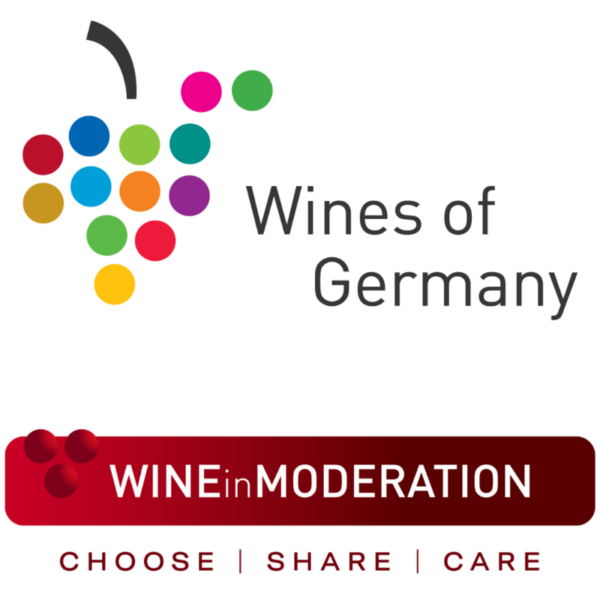Every other month, our 5 to Try series showcases five examples of stellar wines from varying wine styles, grapes, and Germany’s 13 winegrowing regions. As we gather with loved ones for the holiday season, this spotlight is on German wines made by estates supported by multiple family members!
Across European winemaking regions, wine estates tend to be family businesses passed down from generation to generation, and that’s the case in Germany as well. There are plenty of exceptions – from major brands that grew beyond the size one family could manage alone to first generation winemakers who paved their own way – but you’ll mostly find wine bottles boasting the surname of the family that founded the estate and still makes the wine or oversees the business today. As the children who grew up among their parents’ vines develop a passion and appreciation for winemaking, they’ll often start playing a role in the day-to-day functions, gain experience at other estates, and start training to eventually assume ownership of their family wineries.
The German estates below are all managed in some part by parents, children, and other relatives – perfect for enjoying with your own family during holiday festivities!
 1. Ökonomierat Rebholz Estate Riesling Dry, Pfalz
1. Ökonomierat Rebholz Estate Riesling Dry, Pfalz
The Rebholz family has centuries of winemaking tradition behind them, dating back to 1632. Today, the estate focuses on sustainable practices set forward by Eduard Rebholz in the 1950s. Eduard’s grandson Hansjörg, his wife Birgit, and their children Hans, Valentin, and Helene continue the family tradition of sustainable viticulture as the current owners and winemakers, with the twins Hans and Valentin playing a large role in their parents winery. The Ökonomierat Rebholz Estate Riesling Dry is a fresh and lively dry Riesling with notes of citrus, peach and apricot, making it an excellent choice for pairing with fish and appetizers.
Find Near You: Wine-Searcher.com

2. Dr. Heger Ihringer Winklerberg Weissburgunder Erste Lage, Baden
In 1935, Baden physician Dr. Max Heger took an interest in the profession of his winemaking patients and founded the Dr. Heger estate. Max’s son Wolfgang, also known as Mimus, took over the estate next, bringing it to the forefront of German winemaking before passing the ownership down to his own son Joachim in 1981. Like his grandfather, Joachim initially wanted to pursue a career in medicine but was inspired by the passion of the winemakers in his community to trade his medical books for enology at the University of Geisenheim. Today, Joachim and his wife Silvia focus on Pinot varieties with the help of their daughters Rebecca and Katharina. Both daughters pursued wine studies, but Rebecca in particular works hand in hand with Joachim in the vineyards and cellar. The Weissburgunder (Pinot Blanc) from the Winklerberg vineyard has medium acidity with hints of citrus, grapefruit, and lemon.

3. Selbach Incline Riesling, Mosel
The Selbach family’s passion for wine began in 1660, with their ancestors acting as wine merchants, shipping wines down the Mosel River and eventually acquiring vineyards and producing their own wine. In 1964, Selbach-Oster broke off from the family’s larger winemaking operation and became an independent business, now producing wines under both the Selbach-Oster and Selbach brand names. The current owner, Johannes Selbach, grew up around his family’s vineyards and made his first wine in 1975 at a very young age. Johannes and his wife Barbara, with their children Sebastian and Hannah, manage the vineyards and winery and produce wines that have been widely recognized as some of the most renowned in the region. While the next generation of Selbachs play a role in the viticultural and winemaking process, Sebastian has especially developed a passion for wine, and completed studies and apprenticeships in the field before rejoining the family business. The Selbach’s Incline Riesling showcases a vibrant acidity with clarity and precision, tied together with a fruity flavor.
Find Near You: Wine-Searcher.com

4. Jakob Schneider Niederhäuser Riesling Kabinett, Nahe
Weingut Jakob Schneider is run by Jakob Schneider, Jr., his wife Laura, sister Monika, and mother Liesel, all of whom manage different aspects of the estate. The family has deep roots in viticulture going back to 1575, when they began making wine in the Nahe. Jakob has brought the 400-year-old estate into the present day with modern practices while maintaining tradition, such as the use of 2400 and 1200 liter oak casks in combination with stainless steel tanks. While Jakob is responsible for both the vineyards and cellar practices, Laura manages marketing, Monika oversees sales, accounting, and logistics, and Liesel is the soul of the winery with her warm hospitality, while toddler and newborn girls Johanna and Julia represent the next generation of Schneiders. This Riesling features floral notes with an off-dry palate and mineral freshness.
Find Near You: Wine-Searcher.com

5. Allendorf Spätburgunder Trocken, Rheingau
The history of the Fritz Allendorf estate can be traced back to 1773, when Phillipp Anton Allendorf founded the estate. With around 75 hectares, Fritz Allendorf is among the largest family-run wineries in Rheingau. “Family” appears on the Allendorf labels for good reason. Today the estate is owned by Ulrich (“Ulli”) Allendorf and his sister Christine (“Christel”), inherited from their parents Fritz and Lotte. Christine’s husband, Josef Schönleber, acts as manager and oversees the vineyards and operations, working closely with his son Max (nephew of Ulli), who has brought the diverse experiences of apprenticeships at other estates. Even more Allendorfs and extended family are credited on the estate’s website as influential to the business. The Allendorf Spätburgunder Trocken displays scents of strawberries and plum with a refreshing palate featuring soft tannins and red fruits.
Find Near You: Wine-Searcher.com
Plan on trying these wines? Let us know what you’re drinking by tagging @GermanWineUSA!
Facebook | Instagram | Twitter
